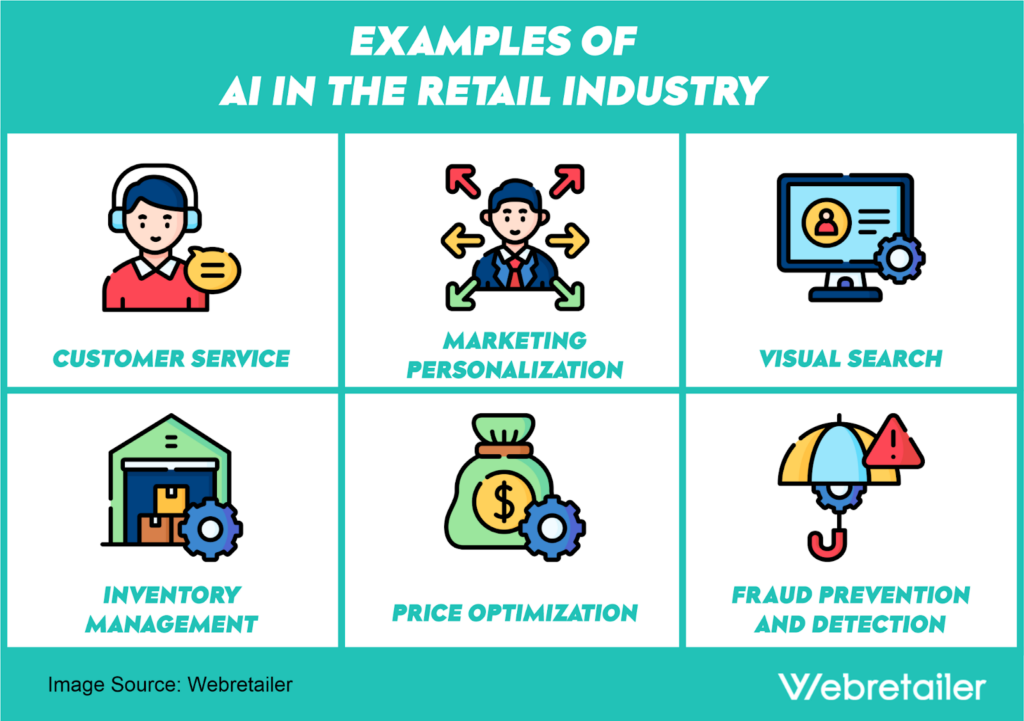
| Starting Price | $6.00/mo |
|---|---|
| Pricing Model | Subscribers |
| Free Trial | No |
| Free Version | No |
Like other aspects of our lives, AI’s impact on retail is undeniable. It is reshaping the entire shopping experience from personalization and customer service to inventory management. Join us to understand what AI means for businesses and customers.
Artificial intelligence in the retail industry has refined our experience in many ways. From personalized recommendations and virtual try-ons to AI-powered chatbot support, the transformation has been significant.
According to a study from Mordor Intelligence, the market size of AI in retail is expected to grow from USD 7.3 billion in 2023 to USD 29.45 billion in 2028 at a compound annual growth rate of 32.17%.
So, what exactly is AI in retail, how is AI used in retail, what are the pros and cons, who are the main players, and what’s in stock for the future?
AI in retail is the use of artificial intelligence algorithms and technologies, like computer vision, natural language processing, and machine learning, in various aspects of the retail industry.
Using artificial intelligence helps to improve the operations’ efficiency, enhance decision-making processes, drive business growth, and improve overall customer experience. Data from Statista found over 60% of retailers affirmed that adopting AI in their stores enables them to meet customer service expectations.

Since artificial intelligence can process huge amounts of data and identify patterns, the usage of AI can help businesses and eCommerce platforms make more accurate predictions and gain valuable insights about their customers.
MORE: AI in eCommerce
AI is changing the retail industry in many ways. It is now easy to identify customer preferences based on their browsing and purchasing history, which will help them get personalized recommendations.
Through machine learning algorithms, AI can analyze vast amounts of data to understand individual shopping patterns. Thus, retailers need not do guesswork. Instead, they can increase sales and customer satisfaction with real-time information.
Another way AI is changing retail is through inventory management and instant support. Retailers can employ AI-powered systems to optimize inventory levels, forecast demand, and automatically reorder stock when needed. They can also improve the shopping experience through AI-powered tools at any time of the day.
MORE: Generative AI in retail

Artificial intelligence has a wide range of use cases in the retail industry, and below are some of the most notable examples:
AI has enabled the use of AI-powered chatbots that make it possible to provide customer support, attend to customer queries, and recommend products throughout the day.
Personalization helps to deliver a much better customer experience, and with AI, retailers can analyze customer data easily to improve how they target them with campaigns and promotions. LK Bennett in collaboration with TrueFit is taking this to the next level by enabling customers to get accurate sizing information and fit preferences.
Finding products is much easier now, thanks to visual search. Powered by computer vision, this technology makes it possible for consumers to find exact and similar products through images.
Managing stock is another area of retail where AI can be useful. AI can keep track of stock levels to minimize overstocking and prevent product unavailability. Cameras powered by AI can also be deployed to monitor shelves in real-time.
By analyzing past and current market trends, like competitor pricing, customer behavior, inventory data, demand and supply, etc., AI can assist in setting optimal prices to maximize profits.
Retailers can also deploy AI to detect and prevent unusual activities to safeguard businesses and their customers.
Several brands are already adopting and integrating artificial intelligence into their retail operations. Below are the brands at the forefront of AI in retail:
Below are the major advantages of AI in retail.
While several benefits accompany artificially intelligent retailing, it also has a couple of downsides you should know.
As modern technologies continue to advance, we can expect better AI algorithms, improved accessibility, and ultimately, better opportunities. Therefore, the future of AI in retail looks promising.
Management tools like Sellware, which makes it possible to manage multiple eCommerce stores, and Ecomdash, which syncs your data across stores, have been made possible by AI.
We can also expect better decision-making as retailers rely more on improving data-backed insights. There’s also no denying the fact that AI may eliminate certain opportunities for humans, but it’s not entirely bad news since it will create more.
When planned properly and implemented effectively, AI in retail can be highly beneficial. Here are some tips any business can leverage to successfully apply AI to their retail operations:
AI in the retail industry is transforming how businesses operate, and customers are served. The current advancement is a testament to a brighter future filled with better automation, hyper-personalized experiences, and more sophisticated technologies.
As previously discussed, the AI use cases in retail are diverse and the benefits are undeniable. With brands like Amazon, Walmart, Alibaba, Starbucks, and Nike leading the way, we can expect even faster development and adoption across the retail industry.
However, it is also critical to consider the potential disadvantages, such as data security, job displacement, biased algorithms, etc., and find ways to limit their impacts.
For now, businesses and individuals can key into the opportunities afforded by AI in the retail industry. Not only will this give them a competitive advantage, but it will position them better for the advancements that are still to come.